Batman: Arkham Asylum, prison system, and mental health
Posted: December 3, 2013 Filed under: psychology, Reflection, Video Games | Tags: Arkham Asylum, Batman, counseling, mental health, prison system, psychology, reflection, Video games Leave a comment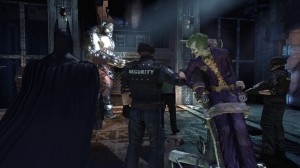 I am not a huge Batman fan. Sure, I know the major basic information that most individuals know of him: orphan, genius, business man, philanthropist, super hero. His world is rather dark and bleak, though depending on the cartoon rendition it could be quite humorous. I never understood the rabid fascination his fans have towards him. So when I finally broke down and bought the WB Bundle a few weeks back, I knew that Arkham Asylum was one of the highest rated games of the year. What I didn’t know was that it was an exploration of the prison system and mental health.
I am not a huge Batman fan. Sure, I know the major basic information that most individuals know of him: orphan, genius, business man, philanthropist, super hero. His world is rather dark and bleak, though depending on the cartoon rendition it could be quite humorous. I never understood the rabid fascination his fans have towards him. So when I finally broke down and bought the WB Bundle a few weeks back, I knew that Arkham Asylum was one of the highest rated games of the year. What I didn’t know was that it was an exploration of the prison system and mental health.
 Language is the first thing that struck me as I began the game. The guards refer to the inmates as “it” and “animals,” language that dehumanizes their existence. Furthermore, the place seems to have been built like a fortress: nothing seems to get in or out without some sort of notice. As such, it puzzles me greatly that some of the inmates (Szazz in particular) escaped without notice.
Language is the first thing that struck me as I began the game. The guards refer to the inmates as “it” and “animals,” language that dehumanizes their existence. Furthermore, the place seems to have been built like a fortress: nothing seems to get in or out without some sort of notice. As such, it puzzles me greatly that some of the inmates (Szazz in particular) escaped without notice.
Now, I am aware that the individuals at Arkham are the worst of the worse, super villains who have done horrid things to Gotham. It is no small wonder that when they get out of their cells and start running around the massive island, the majority of guards are murdered.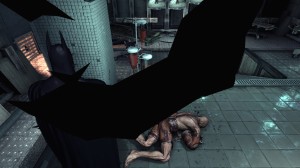 Again, those with the heaviest criminal go there so it may not really matter as such individuals tend to have major trauma in their background and/or personality disorders.
Again, those with the heaviest criminal go there so it may not really matter as such individuals tend to have major trauma in their background and/or personality disorders.
But is this treatment of the prisoners right? More and more in our prison system around the [US] country, there have been reports of abuses in prisons:
http://www.huffingtonpost.com/2013/10/31/prison-problem-population-expansion_n_4181688.html
And I am sure, and know, that there are tons of videos and articles on the problem. As such, it is no wonder that as the game progresses that Batman encounters more and more “insane” inmates as opponents as their poor treatment caused them to lose themselves. The game openly suggests that the environment created such individuals.
Mental health goes in hand with this thought. 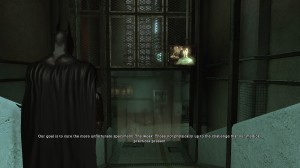 The way Dr. Young talked about their treatment is downright disturbing and sounded like she was talking about lab rats and not human beings. In fact, I doubt that the ACA and the APA (respectively) will approve of her experimentation.
The way Dr. Young talked about their treatment is downright disturbing and sounded like she was talking about lab rats and not human beings. In fact, I doubt that the ACA and the APA (respectively) will approve of her experimentation.
This also brings up the psychiatrists as well.
It is a well known secret in the counseling community that psychiatrists are generally looked down upon by counselors/psychotherapists. The reason for this stereotyped thinking is simple: psychiatrists are medical professionals trained in how medications influence the brain and tend to believe that medication solves everything (delusions cannot be medicated away as they are fixed beliefs). They do not know how to counsel or move their patients/clients/consumers (whichever term you prefer) forward. They tend not to understand how their diction and actions influence their clients’ behaviors and the relationship between the professional and the client.
From what I’ve heard in the tapes so far, the majority of them are not asking their questions correctly (they tend to be closed and do not facilitate exploration) nor are they moving them forward (at least they are not making things worse). An example of this is when one psychiatrist interviews The Riddler about his childhood. Instead of saying, “I want to go there,” she could have responded with “Oh, I thought a person of your intelligence would understand the importance of such exploration.” This feeds not only his ego (which he would probably like), it also helps join with him and would have facilitated some rapport.
By far, the most offensive thing I’ve heard occurs when Killer  Croc asked a psychiatrist if she was going to make him “normal.” Completely missing the point of the question, she responds “Normal is a poor choice of words. What is normal?” While the last part is a solid question that normalizes mental health experiences, he meant that he wants to be a regular person. Thus, he backtracked out of it and fell back on his old routine of intimidation. Whatever rapport they had was broken. She failed to recognize or apologize about this. Considering his background, she should have asked “what does normal look like to you?” That could have gotten him to open up and respond about his dream of looking and being “human” again. Who would have thought that Killer Croc, deep down inside, wants to live a life like you or me?
Croc asked a psychiatrist if she was going to make him “normal.” Completely missing the point of the question, she responds “Normal is a poor choice of words. What is normal?” While the last part is a solid question that normalizes mental health experiences, he meant that he wants to be a regular person. Thus, he backtracked out of it and fell back on his old routine of intimidation. Whatever rapport they had was broken. She failed to recognize or apologize about this. Considering his background, she should have asked “what does normal look like to you?” That could have gotten him to open up and respond about his dream of looking and being “human” again. Who would have thought that Killer Croc, deep down inside, wants to live a life like you or me?
And then there’s the psychiatrist who is treating Poison Ivy who “fell  in love” with her. No board, hospital, or organization will easily trust him again for such an action because it is an ethics violation. As far as they are concerned, even though Ivy has mind control powers, it is the professional’s responsibility as he has the most power in the relationship. Perhaps this is why Harley Quinn’s fall from psychiatric intern genius to villain side-kick seems to be so troubling: she let herself get seduced by Joker’s promises.
in love” with her. No board, hospital, or organization will easily trust him again for such an action because it is an ethics violation. As far as they are concerned, even though Ivy has mind control powers, it is the professional’s responsibility as he has the most power in the relationship. Perhaps this is why Harley Quinn’s fall from psychiatric intern genius to villain side-kick seems to be so troubling: she let herself get seduced by Joker’s promises.
So where does this leave us? Arkham Asylum seems to point out everything that’s wrong with the prison system: poor treatment, lack of mental health procedures, and ultimately a poor prognosis –even for such difficult individuals– for the prison population. Here in the US, we have around a 50% recidivism rate. And as I understand it, a part of it is because it’s the only world that the prisoners understand. The solution might be the opposite of what happens in Arkham: treat the prisoners like human beings, have mental health practitioners who actually know what they are doing, identify problems and solve them before they get out of control, and have stronger safeguards in place to make Arkham a safe place for everyone.
Now, will this work with our prison system? I don’t know. But if Arkham is anywhere near an actual representation of our own, things definitely need to change.
Thoughts on I am Level 1.0
Posted: September 11, 2013 Filed under: psychology, Reflection, Video Games | Tags: experimental games, I am Level 1.0, indie games, locus of control, psychology, reflection, video game analysis, web games Leave a comment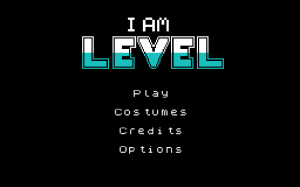 Allow me to introduce you to one of my recent favorites on Kongregate as of late. And a big part of this is due to Indiegames.com bringing it to my attention.
Allow me to introduce you to one of my recent favorites on Kongregate as of late. And a big part of this is due to Indiegames.com bringing it to my attention.
Welcome to I am Level v 1.0. The game is an  odd mixture of pinball and Metroid, The map is a fairly good size and each room. The point of the game is simple: tilt each room and move the springs to help the ball pick up stars (sometimes they look like tea cups) while helping the ball avoid various obstacles. And I love it!
odd mixture of pinball and Metroid, The map is a fairly good size and each room. The point of the game is simple: tilt each room and move the springs to help the ball pick up stars (sometimes they look like tea cups) while helping the ball avoid various obstacles. And I love it!
 How many games put you in control of the actual level? Usually, games put the player in control of a protagonist of some sort who has to conquer the perils of the environment. Sometimes it is man-made (buildings and opponents), it might be a product of how the area was formed (such as the Tibetan levels in Tomb Raider and Uncharted 2), while the rest of the time it is a mixture of those two elements. In fact, the overwhelming majority of games give the impression that it is the character/avatar (whichever term you prefer) that is the agent of change.
How many games put you in control of the actual level? Usually, games put the player in control of a protagonist of some sort who has to conquer the perils of the environment. Sometimes it is man-made (buildings and opponents), it might be a product of how the area was formed (such as the Tibetan levels in Tomb Raider and Uncharted 2), while the rest of the time it is a mixture of those two elements. In fact, the overwhelming majority of games give the impression that it is the character/avatar (whichever term you prefer) that is the agent of change.
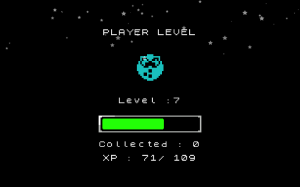 What this is a reference to is the concept of lotus of control. This psychology term refers to how a person views the world. Is the person the master of one’s own fate, or does the person believe that fate controls it all and that fighting is pointless?
What this is a reference to is the concept of lotus of control. This psychology term refers to how a person views the world. Is the person the master of one’s own fate, or does the person believe that fate controls it all and that fighting is pointless?
In terms of the game, the ball has no control over anything. The ball is just there for the ride, or so it seems. Yet the ball will go through all of the challenges ahead of him/her/sie because that’s where the ball needs to go. Sometimes past challenges are repeated for what seems like for fun, other times the challenges need to be repeated because neither the player nor the ball have fully mastered the challenges presented to them.
This also brings in the concept of responsibility. Who does it belong to? Does it belong to fate or does it belong to the Level or to the ball?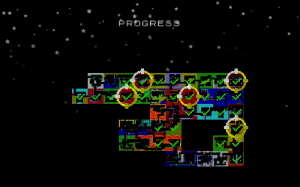 Or is it a mixture of all those thoughts? The player answers this question by playing. It is not the ball’s responsibility to conquer each challenge, it is the Level’s. Whether you want to interpret such a concept as something spiritual (i.e. “higher power”), the natural world, or even as fellow human beings is up to you. For a game that says up front that it is not about seeking some level of understanding of any kind, there’s a little kernel of wisdom underneath its neo-8-bit glow.
Or is it a mixture of all those thoughts? The player answers this question by playing. It is not the ball’s responsibility to conquer each challenge, it is the Level’s. Whether you want to interpret such a concept as something spiritual (i.e. “higher power”), the natural world, or even as fellow human beings is up to you. For a game that says up front that it is not about seeking some level of understanding of any kind, there’s a little kernel of wisdom underneath its neo-8-bit glow.
You can play the game here: http://www.kongregate.com/games/SmilingBag/i-am-level-v1-0
Depression and game development article
Posted: April 22, 2013 Filed under: psychology | Tags: depression, game development, mental health, psychology, psychotherapy, Video games Leave a commentI read an article this weekend about a game designer who developed depression while working with his brother on an indie game. Here’s the link to the article:
http://indiegames.com/2013/04/dealing_with_depression_during.html
It’s an interesting read as he forced himself forward while not properly taking care of himself. Now he’s on an antidepressant and some occasional psychotherapy, though I would would much rather have him invested in therapy that works for him than just medication alone. Perhaps it would be important for his brother to be involved in therapy since he plays such an important role in his life.
So why am I posting a link to this? Simple: we, as a culture and society, don’t talk about this enough.
Cool YouTube videos on video games pt 2
Posted: April 15, 2013 Filed under: psychology, Reflection, Video Games | Tags: brain scans, gaming, psychology, reflection, TEDTalks, Video games, YouTube videos Leave a commentHere are two videos I’ve found by TEDTalks.
What Daphne Bavelier argues is that, in moderation, video games can have a positive effect on a person’s vision and can help a person learn. Gamers, especially action fans, can keep track of more information better than non-gamers and rotate images better, along with adapting to conflicting tasks such as the Stroop Test.
David Perry argues that individuals, especially those from my cohort age group (late 20s) find video games to be quite immersive and could be considered “better” than real life.
What are your thoughts on this?
Game Theory Vs. Feminist Frequency: Why is Feminist Frequency hated?
Posted: March 16, 2013 Filed under: psychology, Video Games | Tags: controversy, Feminist Frequency, Game Theory, MatthewPatrick13, psychology, queer theory, reflection, Video games, zoe flower 8 CommentsA little over a week ago, I had the pleasure to watch the new Feminist Frequency video in over two years(!). What she did was take the trope of the damsel in distress and talked about it’s role in video games. She didn’t dismiss the fact that there were other strong, female characters or that women can’t be “good” protagonists. She talked about how the over use of this archetype influences games and, subtly so, gamers as well.
What has bothered me is that there has been a massive backlash against her because of this video. Yes, the games she references in the video are products of their times (many were published during the 80s to early 90s). Some of the issues she presents were solved at the turn of the millennium. Other issues are still being worked on, such as LBGT narratives (something Anna Annathropy seeks to correct; http://indiegames.com/2013/03/road_to_the_igf_anna_anthropys.html), individuals of ethnic minorities, and, interestingly enough, finding the “right” female lead in video games.
This got me thinking: if Feminist Frequency is receiving hate for publishing a video about a woman’s perspective about video games, which is rare enough as it is (I miss your articles Zoe Flower!) in a hobby that is considered a straight man’s world, then why isn’t MattPat receiving any hate for his Game Theory videos?
The video I linked above touches upon some of the same issues that Feminist Frequency discussed in hers. Sure, there’s some troll comments there but no major problems. So why isn’t this video (or any others in his series) “violently” attacked as hers? Could it be due to gender, SES, perceived sexual oriention (“if she’s a feminist she must be gay!” someone might think), speech style…the list goes on. So I’m going to assume that none of that matters save for the presentation.
Let’s look at MattPat’s style real quick. He talks in a rather fast conversational style. He doesn’t sit in front of the camera talking. Instead, he relies on wallpapers, screenshots/character artwork, trailers, and moving text to provide a witty show. The intro music is upbeat with the world’s most favorite plumber running across the screen and ends with a fan created song that was about the episode’s topic. Finally, he doesn’t take “ownership” of being the expert of the topic–it’s just an idea, a game idea!
How about Feminist Frequency’s approach? She sits in front of the camera, talking to the viewer in a rather calm voice that is even toned. Though she does speak in everyday English in a formal voice (think professor), she adds in the jargon of feminism while explaining what the term means. This helps the viewer get caught up and be able to speak intelligently about the subject matter. In turn, this gives the overall video series a feeling of academia. Furthermore, she also shows short clips of television shows, movies, and, in this case, video games.
In all honesty, I think it’s the academic feel that turns many viewers off. Of course, why do shows like SciShow and 1veritasium are even more popular and do not see the same degree of controversy as Feminist Frequency? Yes, I’m comparing oranges to apples so to speak.
Are we that threatened by a woman analyzing a game? Feminist theory and queer theory demand that its followers (which should be all of us) examine how society influences the individual. Feminist theory looks at the reason why men and women do what they do and why they are pigeonholed into specific roles. By examining these roles and the choices for portraying them are we free to chose what we best like about masculinity and femininity. Queer theory does a similar job: it asks the question why are queer narratives being silenced, the all appearing power of heterosexism, and why society disapproves of individuals who identify as L, B,G, and/or T. Heterosexism and the patriarchy harm us all. What Feminist Frequency is trying to prove is that it harms some of us more so than others.
How many times did you purposefully finish a game that “tasted” horrible to you? Think about that statement for awhile. That’s what gay individuals go through everyday on some level: playing a game that doesn’t fit them.
CT Shooting, Saints Row, Borderlands and the American fetish of guns
Posted: December 18, 2012 Filed under: psychology, Reflection, Video Games | Tags: American culture, Borderlands, Columbine Shooting, Conneticut shooting, gun control, politics, questions, reflection, Saints Row the Third, Video games 1 Comment*Writer’s note: this is a serious topic and may not be appropriate for all readers due to its graphic content and serious approach to the recent CT events. Also, these are opinions. Take what you need from it.*
I know that Dr. Cory Doctorow and his blogosphere have and are blasting the Internet with reflections, rants and raves, and serious beginnings of a highly delayed discussion piece of the recent shootings in Connecticut on Friday. Just like everyone else who has a blog, I feel that I need to add my voice to the discussion.
And there is no amount of proper diction that can truly capture the horror of it and the respect the survivors so desperately deserve. From what I’ve been looking for on it, information seems to be rather guarded. And it seems odd that a 20-year old genius who is dealing with Asperger’s attacked an elementary school (see the Washington Post article on the topic, 12-17-12).
One of my co-workers asked me if a person with Asperger’s should be allowed to use a gun. Personally, I’m anti-NRA. The true answer is, it depends on the individual. Individuals with Asperger’s range on a scale of severity and, obviously, he seems to be one of the more higher functioning individuals. You see, individuals with Asperger’s tend to be highly socially awkward because they do not understand social cues (though they can communicate and can do so quite well) and are obsessed about one topic (maybe two or three if the person is lucky). This diagnosis does not make him mentally ill; it is a life long condition that he has to cope with and learn social skills. And as of this writing, I am not aware of what other troubles influenced his actions.
Let’s get back on point though, as this is a video game orientated blog. Since last week, I’ve been planning a reflection on Saints Row The Third. This GTA “clone” is essentially a murder simulator: gun/run individuals over until you’re the last one standing. While I’ve found it to be fun, it’s also a bit sickening: the protagonist has little regard for human life. Guns can be gathered easily–not even a background check is needed. Furthermore, gangs roam the street with heat obviously seen. They can and will grab citizens for their own protection. And if your avatar dies, he just goes to the hospital while everyone else is left on the pavement. Having access to guns doesn’t make the city safer. It’s more dangerous because the player (and the antagonists) are the real threats to the city.
This GTA “clone” is essentially a murder simulator: gun/run individuals over until you’re the last one standing. While I’ve found it to be fun, it’s also a bit sickening: the protagonist has little regard for human life. Guns can be gathered easily–not even a background check is needed. Furthermore, gangs roam the street with heat obviously seen. They can and will grab citizens for their own protection. And if your avatar dies, he just goes to the hospital while everyone else is left on the pavement. Having access to guns doesn’t make the city safer. It’s more dangerous because the player (and the antagonists) are the real threats to the city.
Or how about my other odd favorite: Borderlands? Guns are just as easily accessible. Heck, you buy them from vending machine for goodness sakes! To counterpoint a conservative point, having access to more guns does not make the game’s world a safer place; it’s even more inhospitable as bandit’s rob the inhabitants as frequently as they can. While the game sets this up on a more western inspired style, it’s still an easy place to die.
Guns are just as easily accessible. Heck, you buy them from vending machine for goodness sakes! To counterpoint a conservative point, having access to more guns does not make the game’s world a safer place; it’s even more inhospitable as bandit’s rob the inhabitants as frequently as they can. While the game sets this up on a more western inspired style, it’s still an easy place to die.
When I started playing video games 25 odd years ago, there wasn’t all this extreme violence available: rapid gunfire, electric deaths, infernos to burn, decapitations, acid baths and impalement. The most violent game on my old NES is the Guardian Legend. One of the most violent SNES games I’ve played is Super Castlevania IV. And everyone knows and “loves” Mortal Combat on the Genesis. Video games are just an easy target because violence flows through nearly every single genre.
Penny Arcade Health to talk about tragedy and video games
And why is that? It’s simple: violence makes things interesting, it keeps things moving. It doesn’t matter if it is a bunch of viruses being destroyed (Dr. Mario) or series of lines that vanish in a flash (Tetris) to stomping on goombas and firing guns at zombies. Would we have it any other way? Probably not. During this time I cannot help but think about an interview Whoopi Goldberg did on the Today Show years ago about violence on television. She was all for it, though she wouldn’t be adverse to directors and writers to try something new.
As I write this post, my mind goes back several years ago when I was in middle school. The Columbine Shooting was the big topic of choice back then. The same arguments from back then are being repeated now: gays caused the problem, gun control doesn’t work, and this is divine punishment from God because we live in a spiritually corrupt society and the two men involved were spiritually bankrupt. The game Doom was to blame because of it depicted Hell. The irony that video games were to blame, and are being blamed again is that it is only here in the US that video games and physical violence go hand in hand (Ten country comparison)
So let’s begin this discussion: what do we as a group of gamers (and gaymers) need to do to change the video game culture? And let’s go even further: why are we holding onto guns, physically or digitally, so tightly? What would truly happen if we gave them up or tightened gun control? What is it about US culture that thrives so much on violence? What can we learn from other Western and Eastern cultures that have lower gun related mortality rates than us? When should a child be allowed to play highly violent games (like Call of Duty) and at what age? What about parent supervision? What can we do, as a society, to make a parent’s job a little bit easier so the parent can be with their child[ren] more? How can we help them with this discussion? How can video games enhance this discussion on gun control?
Yeah, there’s a lot of questions to answer. So let’s get to it.
Silent Hill 2 reflection
Posted: April 9, 2012 Filed under: psychology, Reflection, Video Games | Tags: Konami, Plot & character analysis, PS3, reflection, Silent Hill 2, Silent Hill HD Collection, Video games Leave a commentFor over the past week, I have been playing Silent Hill 2 (SH 2) on the Silent Hill HD Collection (hopefully my review on that will be published soon). So I wanted to take a few moments and think/digest game. (PS. Some major spoilers ahead if you haven’t played the game. Oh, yeah, and we’re going to be talking about some mature stuff in a safe manner. You’ve been warned!)
You see, it has been over 6 years since I’ve played it.
There’s a lot going on in such a short game. The monsters are, for the most part, feminine. And James is killing them. So what could this mean? If you’ve finished the game, you already know James murdered his wife. As such, could he be re-killing his wife through the monsters? Perhaps the spitters puked up gas/substances that Mary puked while sick, thus subtly reminding him of his wife and their challenges.
It’s interesting that Maria’s face is smothered in the jail when James catches up to her. Maria is an interesting character. On the one hand, she can be surprisingly strong willed going so far to search for him while scared. Then she acts all girly, wanting to be protected and doing the “dirty dirty” with him. In fact, I would argue that every action she does is to seduce James.
Yes, it’s great foreshadowing for what we soon understand to be the crux of the problem: James smothered his wife and has extreme guilt over it. In fact, we also learn that he has alcohol abuse issues. Guilt and shame are “good friends” of addiction.
The one character that intrigues the most 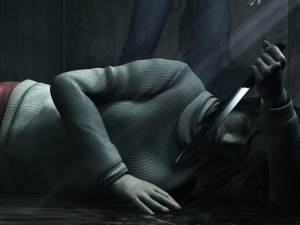 is Angela. This might have to do with reading When Rabbit Howls. The book is a fictionalized autobiographical account of a woman who has 92 personalities living inside her. The reason for this is due to her experiencing extreme abuse (sexual, emotional and physical) from her step-father. Angela seems to have suffered the same fate. Dad molested/raped her, mom solidified the guilt, and the brother…well, no one really knows his role in this tragedy. All we know is that his picture is torn. On top of this, Angela could be dealing with PTSD and survivors’ guilt. She has absorbed the family secret so well that it consumes her.
is Angela. This might have to do with reading When Rabbit Howls. The book is a fictionalized autobiographical account of a woman who has 92 personalities living inside her. The reason for this is due to her experiencing extreme abuse (sexual, emotional and physical) from her step-father. Angela seems to have suffered the same fate. Dad molested/raped her, mom solidified the guilt, and the brother…well, no one really knows his role in this tragedy. All we know is that his picture is torn. On top of this, Angela could be dealing with PTSD and survivors’ guilt. She has absorbed the family secret so well that it consumes her.
The reason James can’t really help her is three-fold. First, he has his own pain that he hasn’t fully resolved. Secondly, he isn’t in love with her. He’s obsessed with Mary (or Maria, depending on ending), not her. And third, he doesn’t k now how to help her. Any time he tries to show her any compassion, especially with the use of touch, she freaks out. There is no way he could predict her reactions. He learned this the hard way due to Mary’s illness.
There’s a lot more that can be written on the game. What are your thoughts?
And these are too good not to share:
Narrative Therapy and Alan Wake: The importance of externalizing the problem
Posted: June 12, 2011 Filed under: psychology, Video Games | Tags: Alan Wake, narrative therapy, video game literary analysis, Video games Leave a commentAre you familiar with narrative therapy? Chances are you probably haven’t heard of it since it is a newer theory of psychotherapy. Developed by White and Epston in 1990 is a constructivist based theory (see Narrative means to therapeutic ends). Instead of the counselor/therapist seen as the expert, the client is seen as the expert of his/her own life. The goal of the therapy is to have the client “rewrite” his/her narrative. This is done in four steps: The problem is identified and externalized, themes and stories that contradict the problem are identified, action is taken to “undermine” the problem, and the new narrative is performed in front of significant people. The main techniques of the therapy use are bibliotherapy (writing and reading to heal psychic scars), certificates, and discussion. Language is how people communicate and is how people tell each other their stories. Language/words have power: the create stories that people inhabit. As such, White and Epston referred to it as a theory of “literary merit.” Narrative therapists do not see power as something that “boxes” people in; it constantly builds people up (both negatively and positively). Thus, everything people learn can be used to either help them grow or hinder their progress. So how does this fit into the game Alan Wake?
Let’s review the overall basic plot of the game: Alan and his wife go to a small town for a quick vacation and she goes missing. Alan is suspected of foul play and all sorts of insanity occur. As such, there are two distinct possibilities. First, either everything that Alan claims (the Taken, Babara Jagger, The metal band based on Norse mythology) is real. Alan’s luck (or bad luck) influenced the events that force him to untangle the events of life. Or, another plausible explanation is that this all a story Alan has concocted to make sense of his life and solve his current problems in order to show Alice how he has changed. Both ideas are highly intriguing.
It’s the latter that seems a bit cooler.
By following along narrative therapy’s idea of externalizing the main problem, Alan externalizes many. Since Alan’s career is that of a writer, he uses his mastery of language to craft a story in which he is able to save his wife from darkness (literally and figuratively since she is terrified of the dark). While there little evidence supporting most of his issues since we see little of his past, there is enough to infer. First off are the Taken, black shadows that almost mean nothing since they keep returning and are practically endless force of frustration. It is possible that he is externalizing everyday issues and bringing them to light. Some Taken are more important than others, such as Stucky who was completely absorbed into his work. Alcoholism is implied, but there is little to prove the concept. Alan may drink a lot (we see an episode of him waking up from a hangover and he knows Alice is going to be ticked at him, and another episode with him and Barry getting drunk at the Anderson farm), he never pines for a glass. He is constantly concerned with what is happening in the here-and-now. It is more likely that it is alcohol abuse, which he uses the substance in inappropriate times and it gets him into trouble. Then there is Dr. Hartman, a man who manipulates people to for what he wants (in terms of literature, he is a foil for Barry). Since he lacks a heart, he potentially represents Alan’s coldness for his wife and those closest to him. Cynthia Weaver weaves (pun quite intended) a tale of love and loss that somehow sounds vaguely like his own. The main thing here is that Alan isn’t going to let his story end on a sad note. He is intent on making things work. Finally, there is Barbara. She is the harsh fan base and the critics who tear apart works for not being creative enough. This is seen all the time in the review world –and as a reviewer, I’m probably no different to an extent. Critics expect things to change and grow and take things further than before, for a writer to mature over time. Then there are the fans who don’t really care. Jagger’s edits takes his writings to the extremes of the fan and critic without taking in Alan’s vision. She represents the so-called “machine” that drove Alan for his massive book tour: making everyone happy but himself.
The most important part is that he recruits an audience for his narrative. This audience is Barry and Sarah. Barry is important because he is Alan’s best friend. Yes, he is coming to terms with how he found Barry annoying. The reason Sarah is recruited is a bit of a mystery. It could be because she is a woman, a female voice needed to balance Alan’s masculine thinking to present to Alice. It could also be because she was available and trying to prove to the powers-that-be how he has changed. It could also be argued that Sarah is Alan’s foil since Sarah comes off as a realist, completely grounded in reality and refuses to let flights of fancy grab a hold of her. Her partnership provides verisimilitude to Alan’s new narrative.
If Alan didn’t externalize his problems, then his attempts to “save” Alice are all for naught. It would be like the “Maria Ending” in Silent Hill 2: Nothing has been learned and the same exact mistakes are going to repeat themselves. Alice would send him away and he would be forced to face losing her from his story. As such, he has to face his fears and troubles, externalize them, and then remove them from his story so he can “rewrite” his life. This is how he finds significance.
*Poster’s note: I am not certified in narrative therapy and uncertain if this how a narrative therapist might view the overall plot. This is meant to be seen as a literary analysis and provide some depth for the game’s plot.
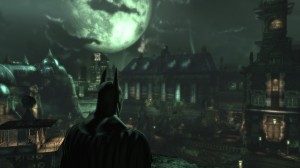


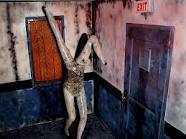
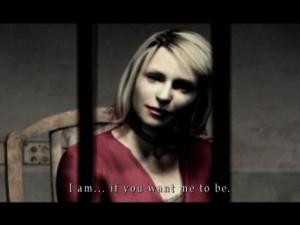
Catherine reflection
Posted: January 12, 2012 | Author: psychphan | Filed under: psychology, Video Games | Tags: Catherine, gender commentary, reflection, scaffolding, Video games, zone of proximal development | Leave a commentWhat I have found intriguing about the game Catherine is that there is no physical violence. Okay, scratch that as there is a lot of violence. However, Vincent isn’t running around swinging a sword/shooting a gun/casting spells to slay his demons. He rises above them. He moves around them, working behind the scenes, moving things around so he can find a solution to the issue.
Wouldn’t you say this is a “feminine” solution?
Think about it. Wouldn’t this be something we’d play if the hero of the story was a woman? Think of Portal. Would the game be as intriguing if the man was the protagonist? What do men usually do in the face of adversity? Given the choice of running or fighting, what do you lean towards? The fact the game takes place in a nightmarish place, I’ll reach for a sword. This is probably even true for some women.
So how does this work with Catherine? Would it be an intriguing experience if Vincent could cut/blast/shoot/punch his way through the game? I honestly think the answer would be “no.” Relationships are all built up, whether it is on lust, honesty, love, values and/or experiences. They are constantly rising. The catch is that relationships are exceedingly volatile and can be destroyed at any given moment. Think about your own relationships with friends, family, and co-workers. How many are still around today? Was it all smooth sailing or did you and your friend/lover/significant-other/family member have to work at things? Did it fall apart because you were climbing different mountains?
Vincent is constantly climbing, moving things around to find the next plateau –the next door to empowerment and improve his relationships. He is, in a literal sense, scaffolding his life. Scaffolding is a counseling term is when the counselor/teacher helps build the client/student up by helping him/her go farther by meeting the person where he/she is in one’s life. It is the real life application of Vygotsky’s Zone of Proximity. The ultimate purpose is to help the student/client his/her goals.
This is what makes Catherine such a powerful game from a narrative perspective. The gameplay represents many things: the opportunity to build new relationships, the process of maintaining and re-pairing current relationships. This is something that even Vincent seems to realize by the game. He has a natural ability to scaffold. He knows what he needs to do and the steps necessary to get there. The results of his work depend on your choices.
So what are your thoughts on Catherine?